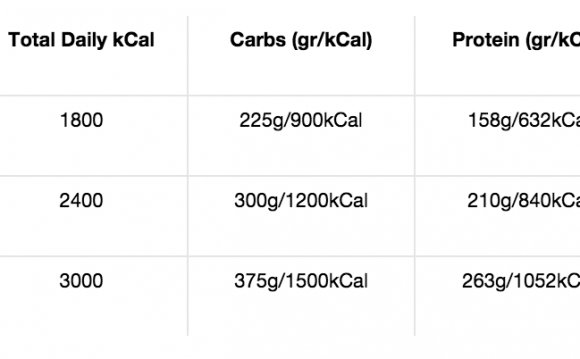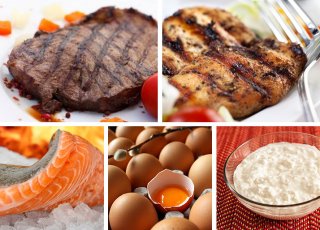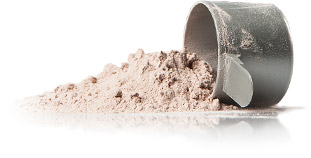

Daily Calories
To build as much muscle as possible and minimize fat gain, it's important to know how many total calories to eat every day. Your caloric requirements are slightly different on training and rest days:
Nonworkout days: 18 calories per pound of body weight, 7 meals per day.
Workout days: 20 calories per pound of body weight, 9 meals per day - including pre- and post-workout nutrition.
Of course, not all calories are created equal! Check the graphic to see the calories per gram of proteins, carbohydrates, and fats. Use the calculator below to see how many calories you should be eating, as well as how many grams of each macronutrient, on both workout and non-workout days.
Shortcut to size
Enter Your Weight
The majority of your micronutrients come from the well-balanced Shortcut to Size nutrition plan, but you'll also want to add extra micronutrients from a multivitamin each day.
Protein
Protein is critical for both building muscle and as an energy source. When building mass, shoot for a minimum of 1 gram of protein per pound of body weight.
 During the Shortcut to Size program, I suggest upping that to 1.5 grams of protein per pound of body weight, and even closer to 2 grams on workout days to really maximize muscle.
During the Shortcut to Size program, I suggest upping that to 1.5 grams of protein per pound of body weight, and even closer to 2 grams on workout days to really maximize muscle.
"Protein is critical for both building muscle and as an energy source."
To a certain extent, more protein produces more muscle mass, but protein isn't all about growth. You also need protein as an energy source. Any excess protein you take in (that's not going to synthesize new muscle) will be used for energy. Complete proteins, like animal proteins, provide all the essential amino acids your body needs.
Lean Animal Protein Sources
- Beef
- Chicken
- Fish
- Eggs
- Dairy (cottage cheese, yogurt, etc.)
Protein supplements are an excellent, and sometimes essential, alternative to whole-food protein sources. Not only do whey and casein provide complete amino acid profiles, but they're both extremely bioavailable. Due to their digestion rates and superior amino-acid profile, there are specific times when a protein powder should be used over whole foods.
 When To Use Protein Powder
When To Use Protein Powder
- Upon waking: After fasting through the night, you need to get amino acids to muscles quickly.
- Pre-workout: Shuttles protein to your muscles for training fuel.
- Post-workout: Quickly instigates muscular repair, recovery, and growth.
Carbohydrates
Carbohydrates are the body's preferred energy source, particularly during workouts. On rest days, aim for 1.5 grams of carbs per pound of body weight. On workout days, since you also have a slow-digesting carbohydrate before the workout and a fast-digesting carbohydrate after the workout, that total rises to about 2 grams of carbohydrate per pound of body weight.
Carbohydrate Choices
Low-glycemic (slow-digesting): These carbohydrate sources enter your blood system slowly, causing less of an insulin spike. Low-glycemic carbs are ideal throughout the day, and include fruits, whole grains, oatmeal, whole wheat bread, whole wheat pasta, and sweet potatoes.
High glycemic (fast-digesting): Fast-digesting carbs hit your blood stream quicker, causing insulin to spike. Fast-digesting carbs are ideal after a workout. Fast-digesting carbs include white bread, white potatoes, sugars, candy, gummy bears, Pixy Stix, and Swee Tarts. Tropical fruits are also typically fast-digesting.
INTERESTING VIDEO












